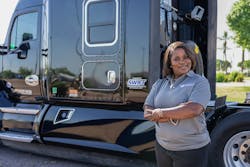This is part of FleetOwner's Fleets Explained, a Trucking 101 series to break down aspects of the trucking and fleet management industries. You can read more from the series, launched in May 2024, at fleetowner.com/fleets-explained. To submit topic ideas, clarifications, and corrections, email [email protected].
When you think of trucking careers, the most obvious is truck driver—but the industry is full of many other jobs and titles to pursue and align with various skills and experiences. The industry is full of stories about those who built up their own fleets or entry-level fleet employees who moved up the corporate ladder to leadership roles.
Younger generations, especially, might not be aware of the career opportunities in the trucking industry beyond driving. Fleets of all sizes have various positions, from on the road and in the shop to office work, including various management and executive positions.
According to the U.S. Bureau of Labor Statistics, more than 40,000 people were working as supervisors or managers in trucking and other material-moving operations in 2023. More than 56,000 were working as truck, bus, and diesel technicians, according to the BLS. The BLS said there were nearly one million workers classified as heavy-duty truck drivers in 2023. There are more than 3.5 million commercial driver’s license holders who could operate in interstate commerce, according to the Federal Motor Carrier Safety Administration.
Even with so many professional drivers and technicians out there, the trucking industry is always looking for more drivers, and various sectors experience driver and technician shortages. This means the trucking industry is a great one to currently try to break into, whether on the road, in the shop, or in the office.
This article outlines different trucking jobs and the skills and experience required for them.
What is a trucking dispatcher?
In the trucking industry, a dispatcher manages freight for a carrier. According to DAT Freight & Analytics, this job includes communicating with drivers, matching them with freight, and setting up their routes. Dispatchers are a fleet’s connection between its customers and drivers.
Some dispatchers are also in charge of finding freight on the spot market using load boards or other connections, speaking to brokers, and conducting negotiations. Often, being a dispatcher includes back-end work such as reviewing truck drivers’ logs and tracking their hours of service.
See also: Transforming the art of dispatching
The requirements for becoming a dispatcher vary depending on the company. However, typically, companies require dispatchers to have a high school diploma or GED and customer service experience. It’s not uncommon for dispatchers to be former drivers.
Here’s the 2024 pay information for a trucking dispatcher, according to Glassdoor:
- Average U.S. pay: $55,882
- U.S. pay range: $52k - $87k
What is a CDL instructor?
A CDL instructor is someone who teaches truck driving students with the goal of them earning their own commercial driver’s license. According to ZipRecruiter, CDL instructors teach at vocational schools, community colleges, and independent truck driving schools. Other than just focusing on driving, CDL instructors also focus on teaching their students about road safety.
According to the Driver Resource Center, these are the typical qualifications needed to become a CDL instructor:
- A valid Class A CDL
- CDL instructor certification
- 2-plus years driving experience
- OTR experience
- High School diploma or equivalent
- Ability to communicate with others using oral and written skills
Here’s the 2024 pay information for a CDL instructor, according to Salary.com:
- Average U.S. pay: $57,840
- U.S. pay range: $49k - $72k
What is a freight broker?
A freight broker is an agent who acts as the middleman between a shipper and a receiver, helping find a suitable carrier to transport freight. According to Inbound Logistics, freight broker responsibilities include negotiating shipping rates, handling compliance, vetting carriers, tracking and managing shipments, and ensuring carriers get paid. Freight brokers usually earn a salary plus commission.
According to Truckstop, freight brokers can work for freight brokerages, their own businesses, or be employed by a fleet. To own your own freight brokerage business, you need prior industry experience or online freight brokerage education. To work at a freight brokerage or within a fleet, a high school education or GED should be sufficient. All freight brokers must register with the Federal Motor Carrier Safety Association; these applications cost $300.
Here’s the 2024 pay information for a freight broker, according to Talent.com:
- Average U.S. pay: $72,500
- U.S. pay range: $50k - $108k
- As mentioned above, it’s important to note freight brokers make commission as well as base pay
What is a trucking recruiter?
A trucking recruiter fills truck driver jobs with the right people. In an industry currently experiencing a driver shortage, the job of a recruiter is an important one. Trucking recruiters can work for recruiting companies or for specific fleets.
According to ZipRecruiter, trucking recruiters follow leads to pre-qualify individuals for a position and screen them before they apply for a driver position. Trucking recruiter responsibilities include handling the necessary employment paperwork for the recruit and educating candidates about the job details to ensure that it is a good fit for both parties.
To become a trucking recruiter, you typically need a bachelor’s degree, industry experience, and/or HR experience.
Here’s the 2024 pay information for trucking recruiters, according to ZipRecruiter:
- Average U.S. pay: $44,000
- U.S. pay range: $29k - $63k
What is a trucking technician?
A trucking technician is an industry job with many different names, such as diesel mechanic, heavy equipment technician, heavy-duty mechanic, and diesel technician. No matter which title is used, trucking technicians maintain and repair trucks, buses, or other heavy-duty vehicles.
According to Schneider, becoming a trucking technician requires a high school diploma or GED. Those pursuing this career should also obtain an associate’s degree, a certificate, or a technical degree. While not necessarily a requirement, it’s also recommended to get hands-on experience while working toward any of the education options listed above.
Here’s the 2024 pay information for trucking technicians, according to ZipRecruiter:
- Average U.S. pay: $56,861
- U.S. pay range: $30k - $78k
What is a fleet manager?
A fleet manager is responsible for overseeing a company’s fleet and its drivers. According to Geotab, a fleet manager’s tasks can include: purchasing vehicles, managing fuel and maintenance programs, tracking metrics, ensuring compliance, manning safety programs, and more. A fleet manager has to balance, ensuring the safety and productivity of drivers while also reducing business costs.
To become a fleet manager, the following credentials and skills are recommended, according to ZipRecruiter:
- High school diploma or GED
- Bachelor's degree in supply chain management, logistics, or business
- Valid CDL and clean driving record
- Fleet maintenance experience
- ASE certification
- Knowledge of OSHA and DOT regulations
While a high school level of education is typically required, industry experience could replace a relevant bachelor’s degree.
Here’s the 2024 pay information for fleet managers, according to Indeed:
- Average U.S. pay: $76,014
- U.S. pay range: $48k - $120k
What is a fleet safety manager?
In the trucking industry, a fleet safety manager controls safety policies for a fleet and ensures compliance with these policies, according to Azuga. Additional fleet safety manager tasks include performing audits, leading training, and investigating accidents. Issues critical to fleet safety managers are distracted driving, telematics, and truck maintenance.
According to Jobzmall, fleet safety managers typically need the following skills and credentials:
- Bachelor’s degree in a field related to transportation
- Around five years of experience in fleet safety and/or transportation
- Knowledge of DOT and FMCSA regulations
- Additional certifications in fleet safety can be required but aren’t always necessary
Here’s the 2024 pay information for fleet safety managers, according to ZipRecruiter:
- Average U.S. pay: $75,509
- U.S. pay range: $35k - $129k
What is an owner-operator?
Owner-operators are independent drivers who own and operate their own small trucking companies. According to the Owner-Operator Independent Drivers Association, owner-operators may lease with a carrier or operate entirely under their own authority. Becoming an owner-operator is a good option for someone who wants the freedom to work independently and be in more control of what routes they drive and loads they haul.
According to OOIDA, most owner-operators have the following:
- A high school education
- Prior trucking driving experience
- If operating under their own authority, carrier registration with the DOT
- Own or rent their own truck
Here’s the 2024 pay information for owner-operators, according to Glassdoor:
- Average U.S. pay: $156k
- U.S. pay range: $117k - $218k
Other trucking careers
The trucking industry holds many different career opportunities and the larger the operation, the more management and executive roles there are. This article can’t go in-depth on every possible trucking job, but here are a few more worth looking into if you want to break into the industry or explore new career options within trucking.
- Billing clerk
- Warehouse specialist
- Security officer
- Operations manager
- Human resources manager
- Administrative services specialist
- Sales representative
- Different technician roles
- Different mechanic roles
- Different driver roles
- Software developer
About the Author

Jenna Hume
Digital Editor
Digital Content Specialist Jenna Hume joined FleetOwner in November 2023 and previously worked as a writer in the gaming industry. She has a Bachelor of Fine Arts degree in creative writing from Truman State University and a master of Fine Arts degree in writing from Lindenwood University. She is currently based in Missouri.









